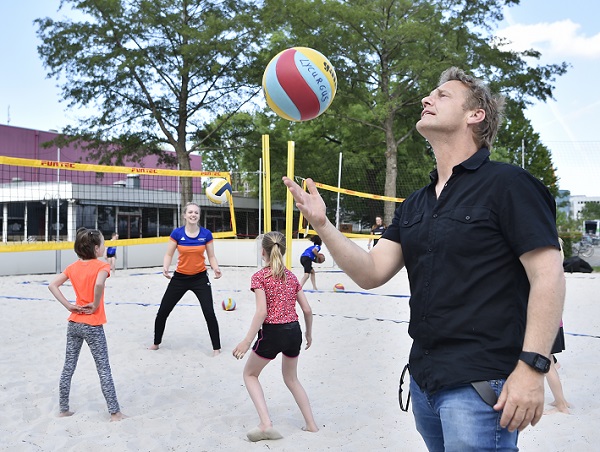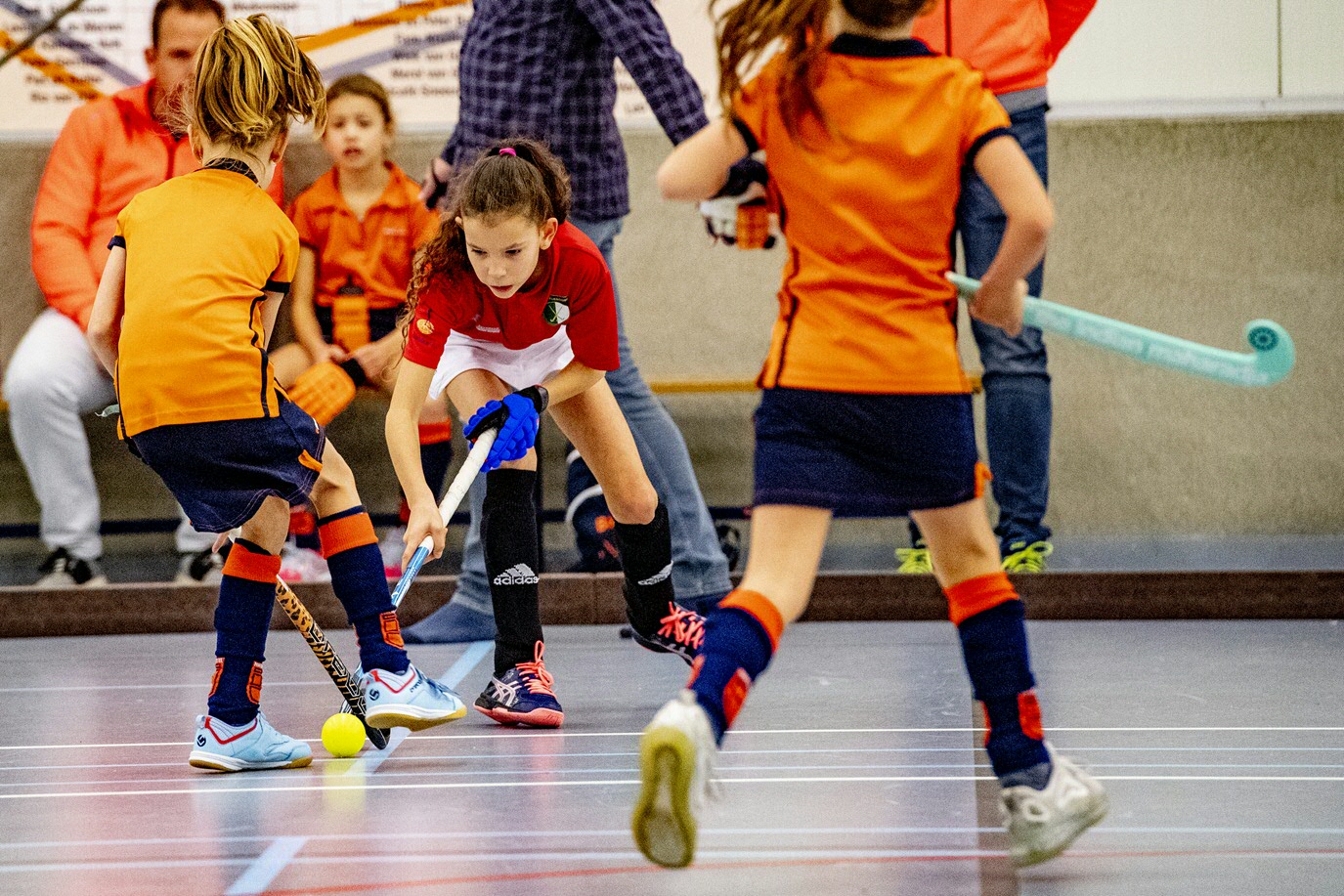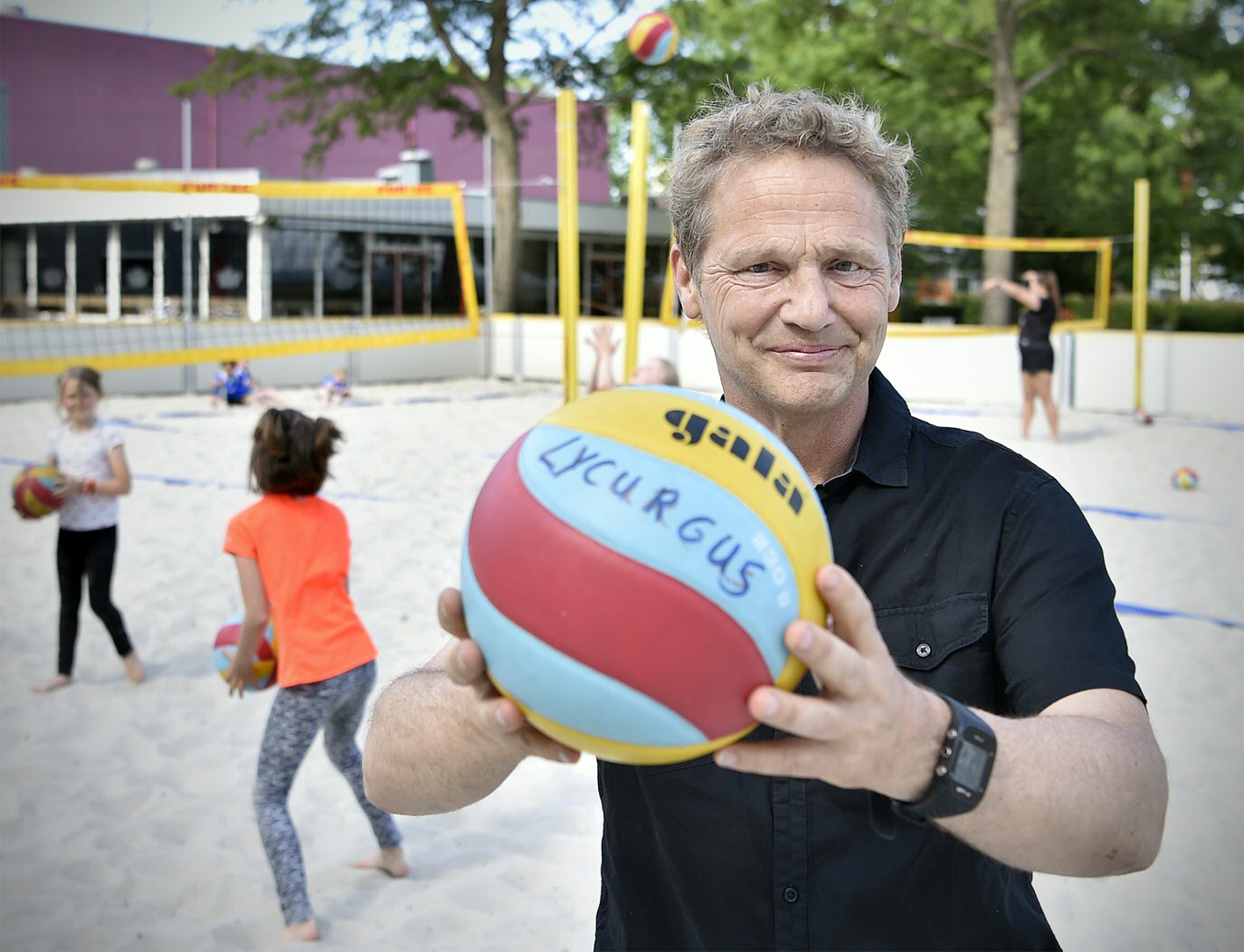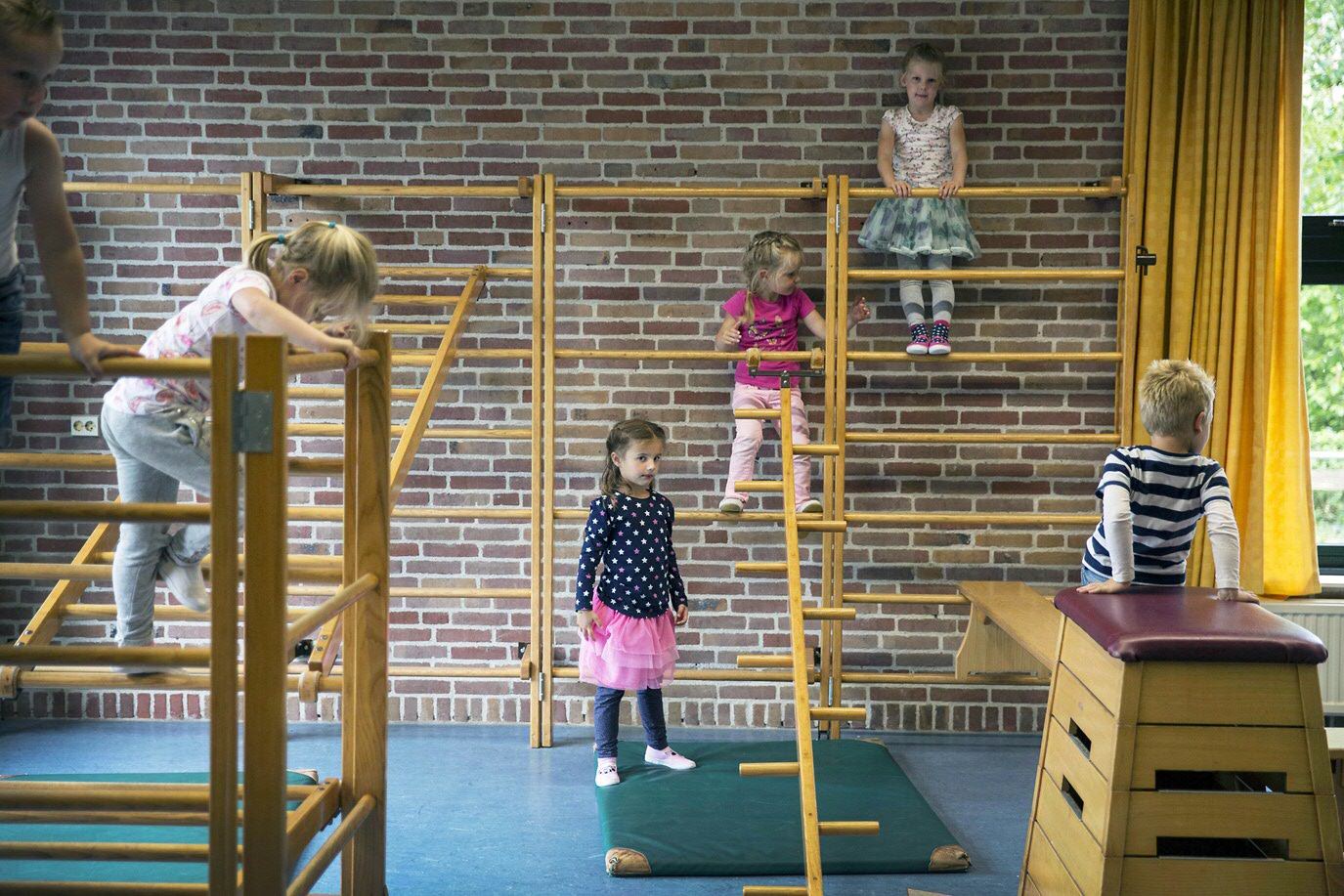How to make children fall in love with sport

He is a lecturer, a researcher and a lector. Undeniably true. But more importantly, Remo Mombarg is a matchmaker. He puts his heart and soul into introducing children to his own personal passion: sport. He takes a particular interest in clumsy children, the ones who aren’t natural movers. ‘Our society tends to present sport as an obligatory daily dose of cod-liver oil. But to fall in love with sport, you have to discover the joy it can bring.’
Text: Riepko Buikema, Communication Office
As if we needed something else to worry about. As a result of the coronavirus pandemic, thousands of schoolchildren have suddenly been confined to barracks for weeks on end. No PE, no sports club, no daily bike ride to school. A minor disaster, according to behavioural and sports scientist Mombarg.
‘The group of non-sporty children will now exercise even less. Almost half of our youngsters don’t do enough sport as it is. Under normal circumstances, a quarter of them get practically no exercise whatsoever. These are appalling figures. In the Netherlands, one in every five children has trouble with fundamental motor skills, such as running, jumping, throwing and catching.’
Wrestling with a skateboard
It’s this last group that interests him the most. Mombarg, lector in Physical Education and Youth Sport at Hanze University of Applied Sciences (Hanze UAS) Groningen, and lecturer and researcher in the Department of Orthopedagogy at the University of Groningen, is fascinated by the way children learn motor skills. ‘I share the public admiration for Michael Jordan. The new documentary about his last season is extraordinary. How on earth does he manage to float in the air for so long? But I feel the same astonishment when I see children who don’t manage these moves. When I see child wrestling with a skateboard. What’s he going to do? How can you help him? What would work best?’

Tear-jerking search
Searching for answers to this question, Mombarg and his colleagues held in-depth interviews with children with delayed motor skill development. Opening question: what would you like to learn? ‘Their answers brought tears to my eyes. “I want to learn to do a head-over-heels”, they said, “so they’ll stop laughing at me”. Children just want to belong. To feel that they can join in. Unfortunately, during PE lessons, these children constantly have to face the fact that their classmates are better at sport than they are.’
Learning to get on with Sportbouwer
A good PE teacher makes sure that children with less well-developed motor skills can experience success and monitor their own progress, claims Mombarg. He has developed a special free app called Sportbouwer, with instruction videos at eight levels. For longboarding, for example, they range from getting on and off with assistance, to riding and stopping without help. ‘Children choose their own starting level. Every step is designed so that they can end with an achievement. All these small successes keep children motivated to practise. The key is in the freedom of choice and autonomy, combined with the joy of movement and pleasure in their own sport.’
Theory-into-practice scientist
Mombarg describes himself as an applied professor. He always works closely with professionals from the field, including PE teachers and physiotherapists. ‘I don’t leave until there’s a solution in the practical field. My mission is to make sport a part of children’s upbringing, so that they can practise their chosen sport in the way that suits them best.’

Dose of cod-liver oil
Fun, fun, fun. That’s the basis, Mombarg is keen to stress. ‘I believe that children need to fall in love with sport. To do this, they need to discover how much pleasure they can get from it. Some of them crave speed, some want to learn a trick and others just want to do something together with a friend. We mustn’t try to formulate normative goals. You hear a lot about the health aspect these days. We tend to present sport like cod-liver oil. You need to take your daily dose. But walking ten thousand steps means nothing to a 14-year-old.’
Life membership
Mombarg himself has tried several sports. His voyage of discovery started with football at Peize football club, and included judo, tennis and even kite-surfing. Much to his delight, Mombarg discovered that various sports associations encourage this type of broad-based motor development. ‘They use balls in gymnastics training. And hockey training often involves balancing exercises. If children want to switch sports in later life, they should be able to. I’m a keen advocate of a sort of life membership for any sport you choose.’
Move-and-learn schools
There’s a lot of ground to be gained in the education system, claims Mombarg. Research carried out at Hanze UAS and the UG showed a decline in the motor skills of children in year 6 of primary school between 2006 and 2016. In addition, children are exercising less. Schools can change this situation relatively easily. ‘It’s completely unnatural for children to sit still at school for six to eight hours a day. We must reorganize our sit-still-and-listen schools into move-and-learn schools. Get rid of the desks and chairs. Movement and motor development are not only important during that one hour of PE, but during the whole day.’

A mini theme park
While travelling around Europe to visit shining examples, Mombarg stumbled across a true paradise. ‘When children arrive at school, they should think: this is fantastic. I visited schools in Finland where they had climbing walls, ladders, slides and swings. Stickers on the ground, hopscotch, ball games in a corner that could be organized at the drop of a hat. The children exercised for 15 minutes every hour, without this affecting their academic performance.’
Mombarg experimented with this system in the Netherlands. ‘Let’s be clear about this; not everything works. I introduced 20 Skippy balls into the classroom in one particular secondary school. It was chaos! Children bouncing around, kicking the balls, teachers who couldn’t cope. But in the end, it’s not that important.’
Trial and error
He is happy to put his own sports performance into perspective. From the medal he failed to get for the Elfstedentocht long-distance skating tour (as an exhausted first-year physical education student, he only managed to reach the finish line in Leeuwarden in 1986 by taking a short cut from the official route between Bartlehiem and Dokkum), to the balls his daughters smash past him these days while playing volleyball.
‘I’ve been beaten on all fronts, fair and square’, he says with a wide grin. ‘But it’s still fun to do a sport together. We’ve always tried a lot of different sports. I remember a particularly miserable afternoon taking trial lessons on an athletics track. It was freezing cold and my poor child realized that she couldn’t run very fast after all. But despite this disappointing experience, I still believe that it’s really important to try things out. To learn that you have to persevere if you want to get better. My daughters are free to choose whatever they like, but I would be devastated if they didn’t enjoy sport.’
More information
- Contact: Dr Remo Mombarg
- Lector in Physical Education and Youth Sport at Hanze University of Applied Sciences Groningen
- Use the free Sportbouwer app to encourage children to improve their sports skills
- Goalkeeper! Stimulates autonomy in sport and lifestyle
- Column on SportknowhowXL: Gym fun in 2029
| Last modified: | 05 December 2023 2.32 p.m. |
More news
-
17 June 2025
The brain as tumble tower
For decades, Monicque Lorist, Professor of Cognitive Neuropsychology, has been trying to unravel how the human brain works. What influences our thinking? What happens when we are tired, or when we age? ‘There‘s still so much we don’t know. Questions...
-
16 June 2025
Science for Society | Wild & Willful
Quite a few children display energetic and headstrong behaviour that does not fit in with the demands our society places on them. Parents, teachers, and pedagogical staff are therefore looking for tools to deal with this behaviour without...
-
11 June 2025
Liekuut | Elite sport brings people together and makes for a great testing ground
Is elite sport only fun for the people who are actually doing it? It generates money and attention, there are special arrangements in place for students who compete at the highest level, and newspapers are full of sports headlines, but how does it...
